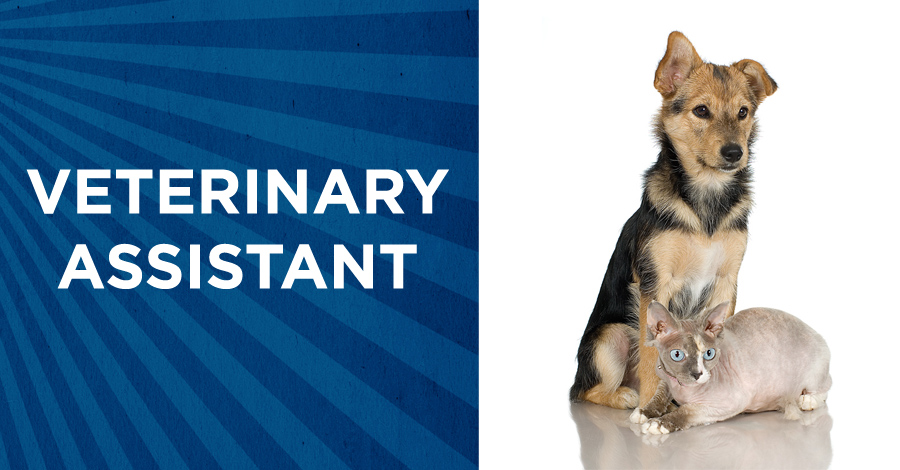In this program, you will acquire the knowledge necessary to support the veterinarian and veterinary technician in their daily tasks while learning intermediate skills. Learn about identifying slides, skin scrapings and tape prep for mites, venapuncture, blood tubes and placing catheters. The program educates veterinary assistants in the
essential skills and knowledge needed to become effective contributors to the veterinary medical care team. Other topics include general veterinary assistant, veterinary medical imaging, surgical preparation, assistance and veterinary pharmacy and pharmacology. One hour is set aside for lunch on your own. Classes must be taken as a cohort in the order in which they are offered. VTHT 1012 is a prerequisite to this program. TVMA Certification exam fees are not included in tuition. (24 meetings) This program consists of 120 hours of accelerated classroom training with emphasis on skills mastery through hands-on practice. (Total 120 Hours) (12 CEUs)
VTHT 1005 Veterinary Medical Terminology: Introduction to word parts, directional terminology and analysis of veterinary terms. (Clock Hours/32, CEUs 3.2)
VTHT 1011 Veterinary Clinical Skills: Survey of basic veterinary and nursing care skills. Includes aseptic techniques, operating room procedures and the roles and responsibilities of the veterinary team in a clinical setting. Describe common clinical procedures, read and fill prescriptions, outline surgical patient preparation procedures and explain aseptic technique and disinfection, medicating techniques, laboratory procedures, radiology and operating room protocol. (Clock hours/40, CEUs 4)
VTHT 1017 Veterinary Office Management: Practical experience in management of the veterinary practice. Emphasis on client relations, record keeping, inventory, employment skills and computer skills in the veterinary environment. Employ client and veterinary team communication, apply basic business principles such as the maintenance of medical records and computer skills and demonstrate employment skills including interviewing, resume writing and appropriate interview attire. (Clock Hours/48, CEUs 4.8)
Course fee: $1,299 Includes consumable supplies and course completion certificate.
Community Job Survey: Average pay is $11 per hour. Pet owners are becoming more affluent and more willing to pay for advanced veterinary care because many of them consider their pet to be part of the family. This growing affluence and view of pets will continue to increase the demand for veterinary care and cause the field to grow faster than average through 2026.
Certification: Upon successful completion of the course and volunteer experience, graduates will receive a certificate of completion within 2-3 weeks after class ends. The volunteer experience log (showing 35 hours completed) must be turned in no later than 10 business days after class ends.

 The Certified Veterinary Assistant (CVA) program consists of two courses:
The Certified Veterinary Assistant (CVA) program consists of two courses: 